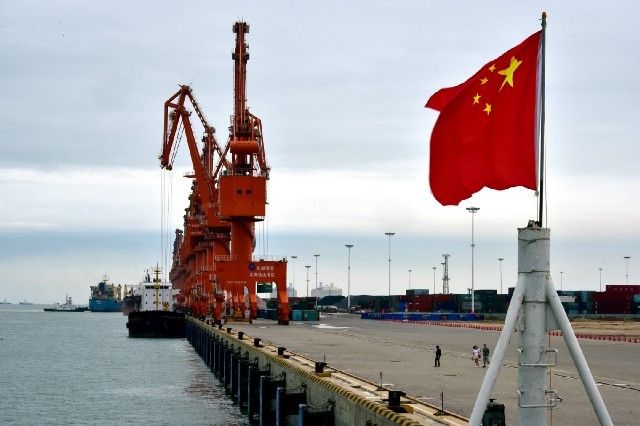After World War Two, the US used its global constellation of naval bases to expand economic and cultural power across the world. Today, China may be flipping that order on its head: establishing a global commercial and infrastructure presence that may, over time, naturally require a security component. After all, who’s going to defend trillions of dollars’ worth of Chinese rails and ports?
Remember, trade-dependent China has benefited hugely from the global naval security provided by the United States Navy. But with a US president who is tired of free riders, and a Chinese president who seeks real superpower status, it’s high stakes on the high seas in the years ahead.More from GZERO Media
The headquarters of United Nations is pictured in New York on Aug. 1, 2022.
The Yomiuri Shimbun via Reuters
GZERO was on the ground at UN headquarters in Manhattan all last week as the General Assembly discussed the most pressing issues affecting the world.
Zelensky snubs China’s peace push, Trump vows to end war “very quickly”
September 29, 2024
Ukrainian President Volodymyr Zelenskyy delivers a speech during United Nations Security Council at the United Nations Headquarters in New York, United Sates of America on September 24, 2024.
The Yomiuri Shimbun via Reuters
Switzerland’s foreign ministry expressed support for the peace plan China and Brazil are pushing to end Russia’s war in Ukraine on Sunday, but it’s a non-starter for Ukrainian President Volodymyr Zelensky, who said he “cannot understand the logic of Switzerland’s decision.”
Hard Numbers: Helene hits hard, Zuckerberg enters the big leagues, US strikes Islamic State in Syria, Majority of Argentines live in poverty
September 29, 2024
Homes are leveled in the aftermath of Hurricane Helene in Horseshoe Beach, Florida, U.S., September 27, 2024.
REUTERS/Kathleen Flynn
A view shows an explosion following Israeli strikes, in Hodeidah, Yemen, in this screengrab obtained from a social media video released on September 29, 2024.
Social Media/via REUTERS
Israel struck Houthi targets in Yemen on Sunday, including power stations and the seaport of Hodeidah.
FILE PHOTO: Shigeru Ishiba, the newly elected leader of Japan's ruling party, the Liberal Democratic Party (LDP) holds a press conference after the LDP leadership election, in Tokyo, Japan September 27, 2024.
REUTERS/Kim Kyung-Hoon/Pool/File Photo
Japan’s new prime minister-elect is no conventional politician by Tokyo standards. Shigeru Ishiba, 67, has sought the top job five times during his 40-year political career, but his candor was unappreciated by colleagues.
- YouTube
AI for Good is more than a buzzword—it's a powerful tool tackling global challenges like food security, disaster response, and water conservation. Microsoft’s Brad Smith highlights real-world examples, such as using AI to analyze water data in Kenya, offering actionable solutions for governments and communities. Through collaborations with universities and NGOs, AI is driving progress on the UN's Sustainable Development Goals, turning technology into a force for societal improvement.
- YouTube
President Xi Jinping has made it clear he wants to bring Taiwan under Chinese control. But how would he actually send troops to the island? And after watching Russia get bogged down in two years of grinding war in Ukraine, has his calculus changed? On Ian Explains, Ian Bremmer lays out Xi’s strategies for achieving his primary political goal: reunification with Taiwan.
- YouTube
AI has immense potential, but guardrails alone won’t ensure its benefits reach everyone. According to Microsoft Vice Chair and President Brad Smith, policies must ensure AI is safe and secure, but equitable access requires more—investment. Just as electricity took over a century to reach parts of the world, Mr. Smith says AI’s widespread adoption depends on economic strategies that go beyond values. It's a balance of ethics and action to ensure AI’s benefits are felt globally.
- YouTube
Disinformation is running rampant in today’s world. The internet, social media, and AI — combined with declining trust in major institutions — have created an ecosystem ripe for exploitation by nefarious actors aiming to spread false and hateful narratives. Meanwhile, governments worldwide are struggling to get big tech companies to take substantive steps to combat disinformation. And at the global level, the UN’s priorities are also being hit hard by these trends.
- YouTube
What issues matter most to women and girls around the world? The United Nations wanted to understand how women all over the globe feel about the future and what they’d like to see for the next generation. The UN's We the Women campaign includes an ambitious survey of 25,000 women in 185 countries and a report on the priorities of women worldwide. GZERO’s Tony Maciulis spoke with Annemarie Hou, Executive Director of the UN Office for Partnerships, which conducted the campaign, to learn more.
© 2020 GZERO Media. All Rights Reserved | A Eurasia Group media company.
